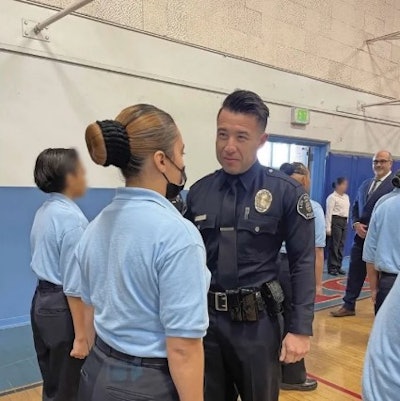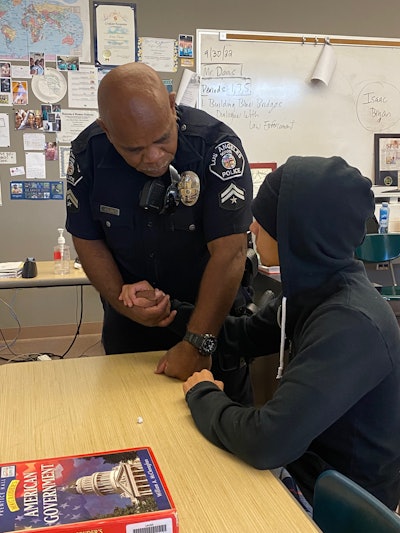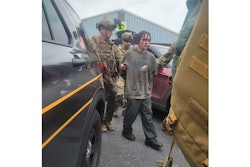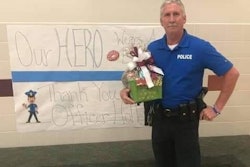 Students participate in a special police academy program at a Los Angeles magnet school. The program helps students prepare for a career in law enforcement.Los Angeles School Police Department
Students participate in a special police academy program at a Los Angeles magnet school. The program helps students prepare for a career in law enforcement.Los Angeles School Police Department
The threat of violence and mass shootings like the massacres at Columbine High School in Jefferson County, CO, and at Marjorie Stoneman Douglas High School in Parkland, FL, speaks to the necessity of having armed officers on school campuses. But is protecting against such threats the real role and purpose of school resource officers? I would argue it isn't.
The real role of the school resource officer who is present on a school campus every day is to provide a model of the purpose of law enforcement that young people can carry with them for the rest of their lives.
Our constitutional republic gives police both power and authority. Most police-citizen contacts can be seen as degrees of confrontation. This can range from casual benign contact to arrest. Most citizens encounter police during traffic and pedestrian stops, and even if the citizen is not arrested, being questioned by an officer and being issued a citation can be seen as a negative outcome in their eyes. These contacts are both authorized and legal but can still be seen by citizens as an unpleasant experience.
The school resource officer assigned to a campus can create an entirely different police-citizen experience for the students, staff, faculty, and administrators that he or she contacts daily.
Students can talk to the SRO in an entirely nonconfrontational framework. From friendly chatter to serious conversations, they can talk to the officer about ideas, feelings, and problems and that can build rapport, trust, and credibility in law enforcement. A positive relationship with an SRO can mold the student’s opinion about police for a lifetime. It can be instrumental in developing and promoting citizenship, a fundamental goal of secondary school education. Most ordinary adults do not have this experience and their contact with law enforcement may only be negative, but the student who attends a school with a school resource officer may have a positive daily experience with that officer and this is a good outcome for both the student and society.
The daily experience of an SRO working on a school campus gives him or her a unique perspective on students concerning their problems and aspirations. Daily contact with students as well as with teachers, staff, administrators, and parents allows an officer to know their school community intimately.
In addition to arresting juvenile offenders, school resource officers can mentor and counsel youth. Because of a daily presence on school campuses, SROs can act as a guide to students who are struggling with problems, and these are problems that if left unanswered could lead students down the path of arrest and incarceration.
One of the methodologies that school resource officers can use to assist troubled youth is to recommend them to diversion programs. These programs are an alternative to prosecution in the juvenile justice system. They expose juvenile offenders to counseling and help that can divert them from a possible life of crime. Because of their knowledge of students and the students' problems, SROs are in an excellent position to make referrals to these diversion programs that could change a young person’s life.
Single mothers have specific problems raising children who may engage in criminal behaviors. These parents have higher incidences of poverty and the additional burdens of physical and mental health stressors. They need help. School resource officers who are women and mothers can be a special source of help for single mothers. When the officer is a mother, that is an additional avenue of rapport and support. The officers are present on the campus and spend time with the errant youth while the single parent is at home or working. This puts the juvenile who is in a critical stage in life, where he or she can become a productive citizen or continue towards a path that can lead to arrests or incarceration. The female SRO can be a role model, mentor, and a surrogate parent for the trouble child of a single mother and that can be a game changer for that youth.
Criticisms of school resource officers often focus on the arrest of juvenile offenders, but it is often forgotten that the SRO who is present on campus also protects students from adult offenders who target and victimize students, teachers, staff, and administrators. Many of these adult offenders have been armed, and only the presence of an armed officer can neutralize such a deadly threat. Protecting students, teachers, staff, and administrators is a fundamental mission of the school resource officer. This ability to deter and neutralize deadly threats is critical but not a daily incident in the lives of most school-based police officers.
One area of criticism and concern about the presence of school resource officers on school campuses is their interaction with minority youths. Critics have stated that the presence of police officers on campus serves to criminalize youth, especially students of color. This phenomenon has been termed the “School to Prison Pipeline.” That term implies the only purpose of police officers on campus is to arrest minority youth and start them on their way to prison. This of course is not true.
The sad fact is many minority youths come from troubled backgrounds and from communities that are often characterized by high crime, high unemployment, and underperforming schools. These factors are common factors in people getting involved in criminal activity. It is also true that the victims of juvenile minority offenders are usually other minority students. Hence, the school resource officer has two roles and opportunities. The first is to protect students, many times minority students, the second is to assist in the counseling of minority student offenders, not just subject them to arrests, but also to help divert them to programs that can change their trajectory away from crime and delinquency.
The philosophy and focus of the juvenile justice system is rehabilitation. Juvenile offenders will be arrested, this is a fact. Juveniles commit crimes and victimize both juveniles and adults. Nonetheless, after arrest, the desire unless a particularly egregious crime has occurred, is to counsel and rehabilitate the juvenile offender and not send the young offender to prison as so often is reported.
Armed school resource officers deployed to school campuses stand ready to deter crime and use force, even deadly force to protect students, staff, teachers, and administrators from threats. Thankfully these violent incidents are rare and are deterred by the officer’s presence.
 A Los Angeles School Police officer counsels a student.Los Angeles School Police Department
A Los Angeles School Police officer counsels a student.Los Angeles School Police Department
The daily activity of the school resource officer deployed to a campus is generally peaceful. Hence, in addition to protecting the personnel and property on school campuses, school resource officers have daily contact with the residents on campus and the most important residents are the students. Students can talk to the officers; the officers can counsel, mentor and guide students, especially troubled students. This is an important relationship with young people who are developing and growing and settling on their future attitudes in life, to include their attitudes towards law enforcement.
SROs are protectors, mentors, and counselors. For students, their experience with and memory of their contact with the school-based officers makes an impression, and that can positively shape the attitudes of young students about law enforcement for a lifetime.
Julio L. Lima, PhD, is a retired lieutenant who served 22 years with the Los Angeles School Police Department. He held numerous positions throughout the Los Angeles Unified School District as a campus and patrol officer, sergeant, lieutenant, and division commanding officer. He is a lecturer in the criminology and justice studies department at California State University Northridge.

















